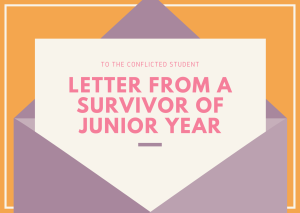April: National Stress Awareness Month
April 24, 2023
Life can be stressful. Managing school, extracurriculars, and work is a hard task. Just dealing with school alone is stressful. April is National Stress Awareness Month to bring awareness and attention to stress and anxiety and the impact it has on people.
Stress can contribute to and be a cause of many different serious health problems if actions are not taken to help when it gets serious. High blood pressure, heart disease, diabetes, and obesity can all be caused by stress. Chronic stress is also linked to six leading causes of death. Some of these include cancer, suicide, heart disease, lung ailments, accidents, and more. Dealing with stress and anxiety is a serious issue that should be talked about more.
So what is stress and anxiety? Medical News Today says, “Stress is the body’s reaction to a threat, whereas anxiety is the body’s reaction to the stress.” From the World Health Organization stress is described as, “A state of worry or mental tension caused by a difficult situation.” There are many different symptoms that people can experience when dealing with either stress or anxiety. If you are dealing with stress you may feel irritable, angry, overwhelmed, worried, or tense. Some other physical signs of stress can include, panic attacks, difficulty breathing, chest pains, constipation or diarrhea, and more. Anxiety has many different types and forms like GAD (generalized anxiety disorder), panic disorder, social anxiety disorder, and more. Due to this anxiety is not the same for everyone and can have a variety of symptoms.
Dealing with stress and anxiety alone can be hard. Sometimes you feel like no one understands what you are going through. But one thing you need to understand is that you don’t have to be alone. Don’t let these feelings of being alone or thinking no one will understand you hold you back from getting the help you need. Just talking to someone is a good first step. A trusted adult, friend, parent, grandparent, sibling, teacher, therapist, and more are all good people to try to talk to. If you are feeling up to it, a school counselor could be someone you reach out to as well. Even though it may not feel like it, there are many people out there who want to help.
What do you do if you want to help a friend who you are worried about that might be dealing with stress or anxiety? Maybe your friend or someone you know has been missing school or suddenly stopped talking to you. Maybe they aren’t interested in things they used to like doing anymore, and they don’t want to hang out. These could all be warning signs that this person needs your help. But what if you don’t know what to say? Use the ALGEE action plan.
A: Approach, assess, and assist with any crises- assess the risk of suicide or harm and look for signs of trauma and high anxiety.
L: Listen to the person non-judgmentally.
G: Give the person reassurance, support, and information.
E: Encourage the person to seek appropriate professional help.
E: Encourage the person to seek self-help and other support strategies
For more information on the ALGEE action plan go here.
Recently a new mental health emergency hotline has been added. If you or someone you know needs help text or call 988 at any time of the day and you will be connected with a crisis counselor.







